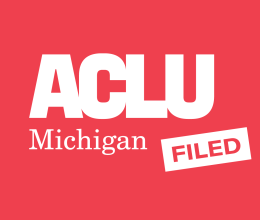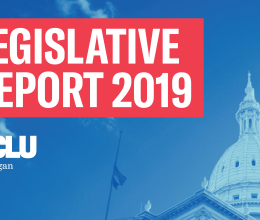DETROIT – Attorney General Ashcroft’s widely publicized announcement last September that a provision expanding the powers of the FBI had not yet been used may no longer be true, the American Civil Liberties Union said today. This suspicion is based on a letter filed by the Department of Justice in the lawsuit challenging a controversial Patriot Act provision.
The letter states: “Given the unique need for confidentiality in the context of foreign intelligence investigations, the Government is simply not in a position to undertake an obligation to keep the Court or the plaintiffs informed on an ongoing basis if and when the Government seeks a Section 215 order from the Foreign Intelligence Surveillance Court."
“The most alarming thing about this letter filed by the Justice Department today is that it says they have no intention of telling the court a federal court, no less about whether they have used Section 215 warrants,” said Kary L. Moss, Executive Director of the ACLU of Michigan.
At issue is Section 215 of the Patriot Act, which vastly expands the power of FBI agents to secretly obtain records and personal belongings of innocent people in the United States, including citizens and permanent residents.
Moss continued, “This isn’t the first time that the government has tried overstep its bounds. This is exactly what the government did when they tried to close deportation hearings to the press and public here in Michigan. They should know by now that it is the court’s right to call the shots about when information needs to be withheld from the public, not the Justice Department’s.”
Although the government letter noted that it must provide a classified report to Congress next month with the total number of Section 215 orders issued since last September, the government said it would not “undertake an obligation to keep the Court or the plaintiffs informed” of that number.
In a court hearing last December, the government argued that the ACLU’s challenge should be dismissed because Section 215 had not yet been used. However, the May 19 letter to Judge Denise Page Hood of the U.S. District Court in Detroit implies that they are now using the provision. A senior trial counsel in the case said that Ashcroft’s announcement only covered the period between October 26, 2001 (when the law was passed) and September 18, 2003 (the date Ashcroft declared that the power had not been used).
The ACLU’s clients in the challenge greeted the news with apprehension. “When this case was filed, we were concerned that our organization’s records would be the target of a government investigation in spite of the fact that we have done nothing wrong,” said Ismael Ahmed, Executive Director of ACCESS, a Detroit-area social service agency in the Arab community whose clients include victims of torture. “Our concern is even greater if even the court has no right to know if a Section 215 order has been issued.”
The judge has not yet ruled on the government’s pending motion to dismiss the case.




